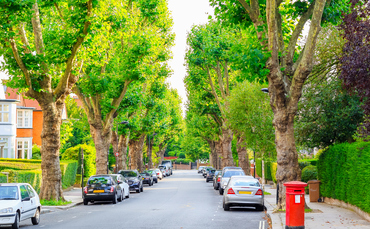

New Defra-backed study reveals how individual trees planted outside forests and woodlands deliver huge economic benefits
Individual trees planted outside of forests and woodland are delivering billions of pounds of economic benefits through carbon sequestration, lower levels of flood risk, and reduced air and noise pollution.
That is the conclusion of a first of its kind study from the Forest Research and Defra that was published today to coincide with the start of National Tree Week.
The report calculates that the economic value of individual trees stands at £3.8bn a year thanks to a host of benefits, including the ability of trees to regulate temperatures, provide habitats for nature, and enhance human wellbeing.
The study revealed that trees outside woodlands make up almost all trees in Great Britain and as such are a major source of carbon sequestration that can play a significant role in delivering on the UK's net zero emissions goals.
The report also estimates the Natural Capital Value of non-woodland trees to be between £68.5bn and £151.5bn, in 2020 prices, providing an estimate of the value of the trees over the course of a century.
Defra said that by quantifying the significant value of individual trees, the report will help to incentivise councils, land managers, businesses, and local communities to plant more trees outside of woodlands.
"Today's groundbreaking research reaffirms the unique value of non-woodland trees which exist all around us - from the trees lining our streets to those dotted around our beautiful countryside," said Forestry Minister Trudy Harrison. "It makes clear the immense environmental and economic value and benefits trees bring to society which cannot be underestimated.
"As set out in our England Trees Action Plan, we have committed to trebling tree planting rates in England by 2024 and by quantifying the significant value of trees, this research will help to incentivise planting in our communities across our country."
The government has faced criticism from MPs and campaign groups, which have warned the UK remains badly off track to meet its tree-planting goals for the end of the Parliament, which could in turn undermine efforts to meet the country's long-term net zero goals.
However, last week the government announced a series of funding awards designed to support tree-planting programmes across the country and Ministers will be hoping today's report provides a further boost to both public and private sector efforts to plant more trees.
"Trees outside of woodlands are all around us: in our gardens, along our roads, in our parks and open green spaces," said Kieron Doick, head of the urban forest research group at Forest Research. "Understanding their value can help make sure councils and landowners invest in the planting of more trees, and their aftercare so that they may continue to provide us with their abundant beauty and benefit.
"While our valuation of non-woodland trees is substantial, we recognise that our research valued just a handful of the many benefits that trees provide. Future research will allow greater understanding and increased values as more of the benefits are included. Our report shows that trees are valuable infrastructure assets across multiple land uses, much as one might think about lampposts or drains. Moreover, it highlights the much greater role of mature trees in delivering benefit to society - in comparison to their younger counterparts."
* This article was originally published here
Comments
Post a Comment